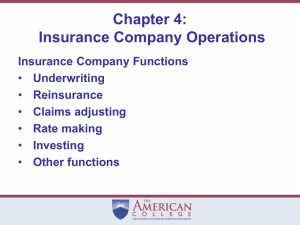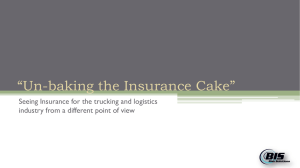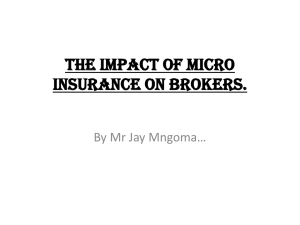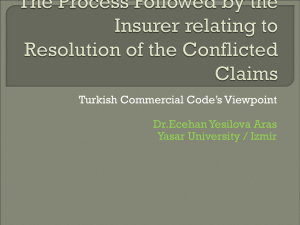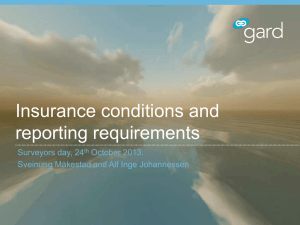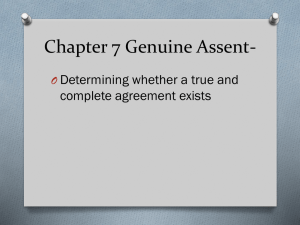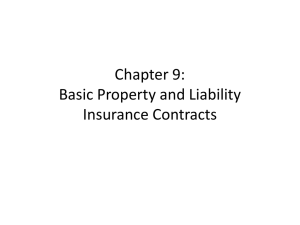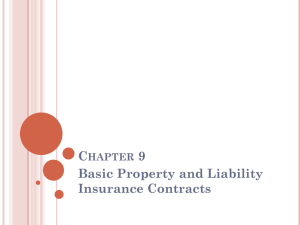The ABI and the Consumer Insurance (Disclosure and
advertisement
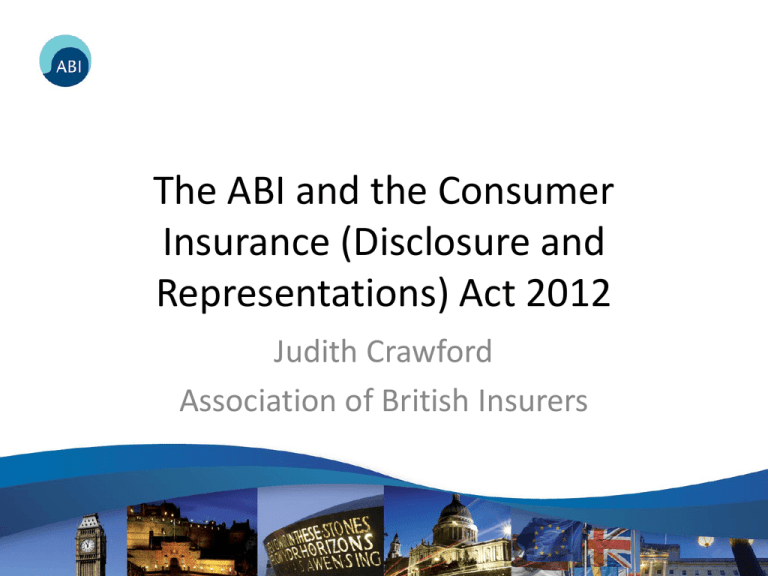
The ABI and the Consumer Insurance (Disclosure and Representations) Act 2012 Judith Crawford Association of British Insurers Contents • Consumer Insurance Act: history and overview • ABI implementation work: question sets, claims and updating documentation • Common questions: additional premium, RTA, mid-term variations • What’s next on the horizon The Act: a long time coming… • 1906: Marine Insurance Act • 1977 (replaced in 1986): Statements of General Long-Term Insurance Practice • 2001: Financial Ombudsman Service (FOS) • 2005: FSA Regulation and ICOBS • 2006: Law Commission review - scoping document • 2009: ABI Code of Conduct for long term protection policies • 2012 Consumer Insurance Act (implementation 6th April 2013) The Act: Quick overview • Applies to all consumer insurance contracts/policies • Places a duty on consumers to take “reasonable care” not to make a misrepresentation Consumer breach of “reasonable care” Insurer had been “induced” into the contract “qualifying misrepresentation” – insurer access to remedies What does it change? The consumer’s duty to disclose information is replaced by A duty to take “reasonable care” not to make a misrepresentation This means: consumers will no longer have a duty to disclose anything they have not been asked. What does this mean in practice? If misrepresentation/non-disclosure is discovered, first ask why. Three options : – The consumer took reasonable care, answering the questions to the best of their ability – The consumer was careless in responding to the questions they were asked, or – The consumer deliberately or recklessly misrepresented the facts What is reasonable care? (S.3) The Act sets what should be considered when deciding whether or not the consumer took reasonable care: – – – – – – the type of consumer insurance contract, and its target market, any relevant explanatory material or publicity produced or authorised by the insurer, how clear, and how specific, the insurer’s questions were, If the consumer has not responded to questions asked at renewal or variation of the contract, how clearly the insurer communicated the importance of answering those questions (or the possible consequences of failing to do so), whether or not an agent was acting for the consumer If the insurer was, or ought to have been, aware of any particular characteristics or circumstances of the actual consumer. What is deliberate or reckless? (S.5) • Move away from the use of the word “fraud” because of the criminal implications • The consumer has behaved deliberately or recklessly if they: (a) knew that their answer(s) was untrue or misleading, or did not care whether or not it was untrue or misleading, and (b) knew that the information they misrepresented was relevant to the insurer, or did not care whether or not it was relevant to the insurer. If the insurer has asked for particular information, it can be presumed (unless the contrary is shown) that the consumer knew it was relevant to the insurer • The burden of proof is on the insurer to show that the consumer was being deliberate or reckless. What is careless? • Everything in-between! • A misrepresentation is careless if you can show that the consumer did not take reasonable care, but neither were they deliberate or reckless. Inducement Consumer breach of “reasonable care” Insurer had been “induced” into the contract “qualifying misrepresentation” – insurer access to remedies If a breach of “reasonable care” has taken place, the insurer also has to show that, had they known the correct information from the start, they would not have taken on the contract on those terms i.e. they were “induced” into the contract. What does this mean for claims? If either a breach of reasonable care or inducement cannot be proved: Insurer pays claim if covered by the contract terms If misrepresentation was reckless or deliberate: insurer can avoid policy and keep premium If misrepresentation was “careless”: Proportionate remedy based on what the insurer would have done had the misrepresentation not occurred What is the proportionate remedy? If the risk would not have been taken on avoid claim and return premium If other conditions would have applied apply these to the claim If a higher premium would have been charged reduce claim by a proportionate amount Other changes • • • • • Ban of “basis of the contract” clauses Group insurance policies Life insurance on behalf of another Agency status of intermediaries (Schedule 2) Definition of a consumer contract: – “mainly or wholly for purposes unrelated to the individual’s trade, business or profession” (S.1) Questions? Overview of ABI work • April 2012: ABI event on implications of the CIA • June 2012: ABI implementation working group : 1. Work with insurers and distribution partners on point-of-sale practices 2. Understand how to treat claims 3. Ensuring FCA/ABI/FOS codes, rules and guidance are consistent with the Consumer Insurance Act 1. Point-of-sale • “Reasonable care” takes into account: – Relevant explanatory material or publicity produced or authorised by the insurer (S 3 para 2b) – How clear, and how specific, the insurer’s questions were (S 3. para 2c), and – How clearly the insurer communicated the importance of answering those questions (or the possible consequences of failing to do so) – for renewals (S 3 para 2d) • Evidence from the FOS on common non-disclosure complaints • ABI Recommendations published December 2012 ABI RECOMMENDATIONS Default answers • Default answers can provide benefits to consumers (e.g. speed). • However, they are more likely to lead to misrepresentation. • Care should be taken to reduce the use of default answers. Help text • Insurers may not always be able to rely on help texts. • Consumers should not be expected to take positive action to be able to view help text. • It is best to have help text that automatically pops up without requiring positive action from consumers. Assumptions • Things to avoid include having long lists of assumptions, putting assumptions in the Terms and Conditions pages on the website. • Consumers should be asked to confirm that the assumptions are correct. • Warning notices highlighting the consequences of incorrect assumptions can also be helpful. Rolled-up questions • Rolled-up questions are more likely to lack clarity. • They also have a higher tendency to confuse consumers. • Consumers find it more difficult to answer accurately where their answers are different. Warning notices • Consumers should be reminded about the importance of taking care to answer questions accurately. • This should be done at the start of the sales process • Warning notices should also highlight the potential repercussions of making a misrepresentation. Conclusion Consumer demand for quick sales processes must be balanced with the need for full and accurate disclosure. 2. Treating claims • Claims scenarios • Law Commission input • FOS seminars for motor, property, travel and protection claims handlers • FOS Technical Note on Non-Disclosure 3. Updating Rules and Guidance • ABI Code on Non-Disclosure and Treating Customers Fairly for Long-Term Protection Products • FOS technical note • FCA to consult on changes to rules • Insurer and broker changes to documentation Common queries • • • • • • • Third party claims – Road Traffic Act Underinsurance Additional premium Misrepresentation where no claim is involved Definition of consumer Joint policyholders Renewals What’s next? Law Commission review of: • Law on warranties e.g. the requirement on a customer to inform the insurer about any changes to their circumstances, • Law on Post-Contractual duties, such as paying a claim on time, or remedies for fraud • FCA Discussion Paper on Transparency , which includes claims stats • FCA Thematic Review on Claims

